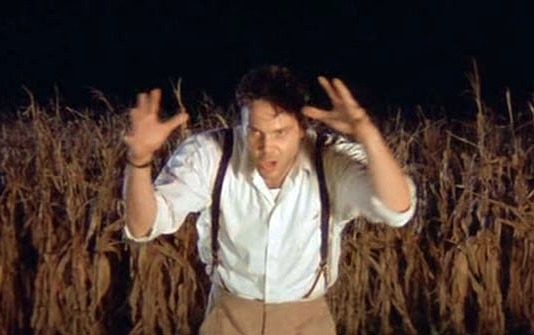When I first moved to Los Angeles with the idea of being a stuntman, I made money by teaching Gymnastics. Having been a gymnast, this came quite easy to me and it wasn't long before I was teaching an adult tumbling class. Here in Los Angeles, most of the people who attend an adult tumbling class are actors, stunt people, dancers and martial artists.
One of the actors in my class told me he was writing a screenplay. This fascinated me intensely. I had been a literary major and journalism minor in college and the thought of writing a screenplay had never ever occurred to me. I had written short stories.
But the more I thought of it, the more I wanted to write a screenplay. To do this right, I reasoned I must read books on screenplay writing and actual screenplays as well. I read a couple of books. One was by Syd Field of course.
Back then - in those dark ages before the Internet - the only way to get ahold of screenplays was to go to this store in Hollywood and buy them. I picked up a bunch from films that I loved. After reading four or five. I started writing my own screenplay.
A few weeks later, I saw my actor friend at the gym. I asked him if he had finished his screenplay. His reply was, 'not yet.'
I had worked out my outline, fleshed out my major characters and dove into Act One.
After about six weeks, I again asked my actor friend if he had finished his script. He once more replied, 'not yet.'
I had just finished my first screenplay. Then I wrote a second one. My actor friend who had given me the idea to write a script in the first place, still hadn't completed his first screenplay.
I don't know if he ever finished that screenplay.
To date, I've written at least forty screenplays. Many were for hire by small independent producers. At least ten of them were made into films. Not many of them were very good, for various reasons that were out of my control.
The point is, writing takes perseverance. Of which, gymnasts have plenty. In the sport of gymnastics, when attempting a new high level, high risk skill you have to fail over and over again for months, before mastering it. That means falling on your face over and over again.
After ten years as a stuntman, I decided to go at the writing thing full time. I went from always having money to always being broke. Most of my stunt friends deserted me once I could no longer hire them for jobs. I found out who my true friends in Hollywood were: my dog. At a low point, I slept in my car with my dog.
Now after years of people telling me how to rewrite my scripts to satisfy their own over-inflated egos, I've started my own independent publishing company. And I don't take notes anymore. Well, I still have an editor and she gives me her opinion. If I think she's right, I make the changes. But I'm the owner of my company and, if I don't agree, I don't make the changes. I'm writing the books I want to write, exactly the way I want to write them. Which is the way I think it ought to be.
Or in the immortal words of actor Vincent D'Onofrio in "THE WHOLE WIDE WORLD" (where he played Robert E. Howard the pulp fiction writer who created Conan the Barbarian), "I'm the boss. The typewriter is the employee."
I've written two novels and am currently writing my third. And at the beginning of each novel, I felt like I was at the bottom of a mountain, looking up at the top in the clouds. And everyday, I clawed at this mountain.
Some days I wrote a little, some days I wrote a lot.
But I know the process. The first sign of progress is the halfway point. I pretty much know how long my novels are going to be. My first novel was a little over 60,000 words. My second one was approximately 62,000. This latest one should be about 70,000.
I'm at almost 20,000 words (way behind schedule). So, when I reach 35,000 words (the halfway point), I'll begin to see the light at the end of the tunnel. When I reach 50,000 words it will be easy sailing. My first pass should come in around 63,000 words. Then when I go back and start to rewrite and add scenes that I realize are missing, it should pad out to 70,000 without me consciously trying to break 70,0000. If it comes in a little less that's no problem either (like I said, I'm the boss).
I remember something I read once, I think Syd Field had said it. It was: as you near the completion of your project, you may find yourself holding back, not wanting to finish this labor of love. He said that was natural, but that you must finish it. You must finally give birth to your creation.
I remember when I read that I thought it was a bunch of bologna. Until I experienced it myself. I was dwelling on my work. Reluctantly to finally type: THE END, until I did. No matter how torturous it is, writing is also a labor of love (if you're writing for the right reasons).
I don't write for money. I don't write for fame. Although I want all those things, I write because I love writing.
It's art.
It's therapy.
It's chicken soup for the tortured soul.
